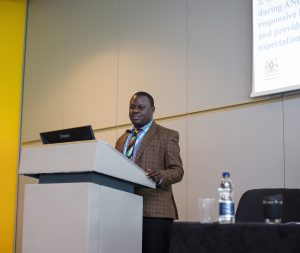

By Dr Peter Waiswa | The recently concluded 11th European Congress on Tropical Medicine and International Health shone a light on state-of-the-art updates, developments, and breakthroughs in the field of tropical medicine and global health.
I am a co-investigator on the USAID funded Kampala Maternal Newborn HealthProject (MaNe) in Uganda, a three-year (2019-2021) USAID-funded implementation research project aimed at harnessing public and private health care systems as well as generating evidence on effective and feasible approaches to improve maternal and newborn health among the urban poor in Kampala.
Learning from other case studies
The organized session on innovative approaches to improving maternal health in cities at the European Congress was especially pertinent. As cities increase in size due to rural-urban migration, the population within cities is expected to increase exponentially. Health services are out of reach for poor women giving birth in informal settlements. At this session, participants shared their experiences working on urban public health as well as benchmarks for successful outcomes.
Case studies shared from Nigeria and Lebanon showcased the typical challenges of referrals and using innovation to improve outcomes in crisis settings. In the Nigerian case study, researchers sought to examine how, and to what extent, the components of referral are recorded in patient medical records for women with obstetric emergencies that are referred to an urban hospital. They found that “several components of effective referral were rarely recorded in patient records, including pre-arrival notification, mode of transport and who accompanied the patient.” This reflects the challenges the MaNe project has identified in Kampala as well. The Lebanese experience showed that a midwifery-led childbirth service can improve maternal and newborn outcomes in a congested, poor urban setting, akin to the slums of Kampala and other cities grappling with shaky health systems. From discussions on work done in Manila, Philippines, and in Villa Nueva, Guatemala, we learned about the role of policy in shaping health in cities. In an informal vote following the presentations, participants ranked health facility congestion and poor quality as the most critical issues in maternal and child health facing cities in developing countries.
Key lessons that emerged
To me, these case studies were very motivating because they showed a path forward. During the discussion following the presentations, participants agreed that decongesting referral hospitals should be the key priority to improve maternal and newborn health in cities.
Several perspectives participants shared during the session resonated with me:
- Solving hospital congestion in cities needs to go beyond city boundaries by strengthening healthcare in neighbouring districts to manage the flow of clients seeking care in cities.
- Establishing efficient communication between facilities is critical. Developing two-way communication between referring facilities and tertiary facilities can help manage incoming cases and avoid unnecessary referrals.
- Referral facilities should focus on high-level care and not on basic and primary care.
- Innovative solutions are key to engaging the private sector and improving the quality of care.
Ultimately, understanding the peculiarities of developing cities and using this to develop an urban health policy and provide evidence-based implementation that fit each city’s unique context and challenges is the best approach to solve urban health problems. The MaNe project’s contribution to this in the context of maternal and child health and is reflected in the project’s three objectives: 1)understanding current referral pathways; 2) defining facility readiness for referral; and 3) improving inter-facility referral transport. Through collaboration with of Kampala Capital City Authority, Population Services International, the Uganda Ministry of Health, and Makerere University School of Public Health, the MaNe project will work to improve communication among health facilities in the Kampala Metropolitan area through a call center with linkages to ambulatory service providers. It will also build the capacity of health workers to manage referrals better and improve the overall quality of service. In the end, we hope to have defined, replicable referral standards based on implementation experiences #
Dr Waiswa is an Associate Professor, Dept of Health Policy, Planning and Management, Makerere University School of Public Health, Uganda & Global Health Division, Karolinska Institutet, Sweden; Leader Makerere University Centre of Excellence for Maternal and Newborn Health & the INDEPTH Network Maternal and Newborn Health Research.
This blog was first published on www.harpnet.org
